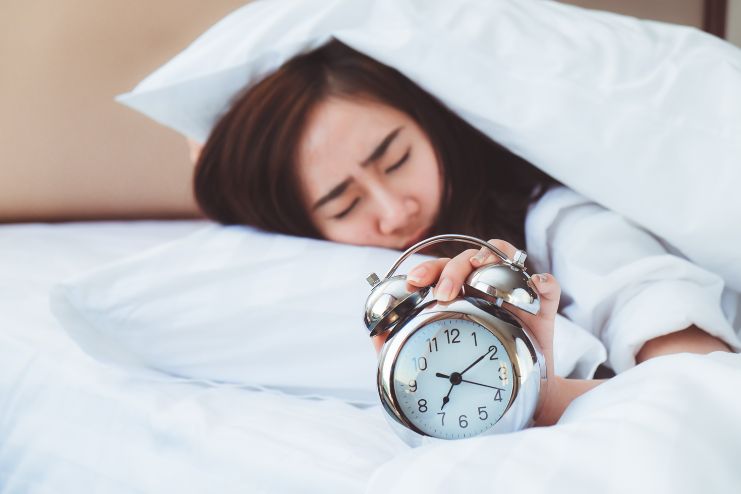Affiliate Disclaimer
Some links in this article are affiliate links. We may earn a small commission if you make a purchase through these links, at no extra cost to you. We only recommend products we find useful to our readersSleep plays a crucial role in maintaining health and productivity, yet many struggle to get the recommended 7–9 hours of rest each night. In search of better efficiency, some are turning to alternative sleep patterns like polyphasic sleep, which involves breaking sleep into multiple shorter periods throughout the day instead of one continuous stretch at night.
But what is polyphasic sleep? It refers to sleep schedules that include multiple naps or segmented rest periods, such as the Everyman schedule, which combines a short core sleep with naps, or the Uberman schedule, which consists solely of short naps.
Advocates claim these schedules maximize wakefulness and improve productivity, but research on their effectiveness is limited.
While some may adapt, others experience sleep deprivation, poor cognitive function, and mood disturbances. Since quality sleep directly impacts focus, energy levels, and overall well-being, it’s essential to approach polyphasic sleep cautiously and prioritize sustainable rest for long-term productivity.
READ MORE: Acupressure Mats Improve Your Sleep
Understanding Polyphasic Sleeping

Polyphasic sleeping is a sleep pattern where rest is divided into multiple shorter cycles rather than a single long sleep. Unlike the typical monophasic sleep pattern, polyphasic sleep schedules are designed to distribute sleep across 24 hours in smaller segments.
Some people adopt this approach to optimize their sleep schedule, but its long-term effects remain a topic of debate.
Types of Polyphasic Sleep Schedules
- Biphasic Sleep: One of the most common variations is biphasic sleep, which consists of one extended sleep session at night combined with a short nap during the day. Many cultures practiced biphasic sleep historically, particularly in warmer climates where midday naps were common.
Some believe this pattern can improve alertness and overall well-being, often called biphasic sleep benefits.
- Everyman Sleep: Another well-known schedule is the Everyman sleep cycle, which includes a shorter core sleep of around three hours, supplemented with multiple short naps throughout the day.
This method aims to reduce overall sleep time while maintaining energy levels.
- Uberman Sleep: For those who prefer an even more structured approach, Uberman sleep involves taking six or more naps, each lasting about 20 minutes, spread evenly throughout the day.
This schedule drastically reduces total sleep time but requires strict discipline and adaptation.
- Dymaxion Sleep: Lastly, dymaxion sleep consists of four 30-minute naps spaced six hours apart, leading to just two hours of sleep per day.
This is considered one of the most extreme polyphasic sleep schedules and is rarely sustainable for most individuals.
Polyphasic sleep, including Uberman sleep and the Everyman sleep cycle, offers alternative ways to structure rest. Still, it is not widely recommended due to the body’s need for sustained deep sleep.
While biphasic sleep may provide some advantages, other extreme sleep schedules can disrupt health and cognitive function. Before making drastic changes to sleep patterns, it is essential to consider long-term effects.
READ NEXT: Top EMF Blocking Devices for Better Sleep
How Polyphasic Sleep Affects the Body and Mind

As we have seen above, polyphasic sleep involves dividing sleep into multiple shorter periods instead of having one long sleep session. This method is part of alternative sleep schedules, which some people adopt to increase wakefulness and productivity.
While it offers potential benefits, it also comes with risks that can impact cognitive function and overall health.
Potential Benefits
- Increased Productivity and Alertness: Some proponents of polyphasic sleep claim that shorter, frequent sleep cycles help them stay more alert and focused throughout the day.
- More Waking Hours for Work, Study, or Creativity: By reducing total sleep time, individuals may gain additional hours for tasks, allowing them to fit more activities into their daily routines.
- Can Work for Some People If Adapted Correctly: Some individuals successfully adjust to schedules like the Uberman sleep or the Everyman sleep cycle, where structured naps help maintain energy levels. However, adaptation varies from person to person.
Challenges and Risks
- Initial Adaptation Difficulties: The transition to a polyphasic sleep schedule can cause severe sleep deprivation in the early stages, making it difficult to function properly.
- Impact on Cognitive Function and Memory: Research suggests that fragmented sleep may interfere with memory retention and learning, as deep sleep—essential for processing information—is often reduced.
- Effects on Health and Metabolism: Disrupting the body’s natural sleep cycle can lead to hormonal imbalances, weakened immune function, and metabolic issues.
Does Polyphasic Sleep Affect Memory and Learning?
Sleep is crucial for cognitive performance, particularly memory consolidation. Studies indicate that reducing total sleep time or breaking it into small naps may prevent the brain from entering deep sleep stages, negatively affecting learning ability and mental sharpness.
While alternative sleep schedules like biphasic sleep may have some benefits, extreme versions like Uberman sleep often fail to provide sufficient rest for proper cognitive function.
Polyphasic sleep may seem like a way to maximize productivity, but its risks outweigh the potential benefits for most people. While some may adapt to alternative sleep schedules, many experience sleep deprivation and cognitive impairment.
Before attempting drastic changes to sleep patterns, it’s important to consider the long-term effects on health and well-being.
READ MORE: Best Foods to Eat Before Bed for Deep Sleep
The Science Behind Polyphasic Sleep

Polyphasic sleep is an alternative sleep pattern where rest is broken into multiple shorter periods instead of one long stretch at night. While some believe it enhances productivity, scientific research highlights concern about REM sleep disruption and sleep deprivation.
Understanding sleep cycles and the effects of irregular sleep can help assess whether polyphasic sleep is beneficial or harmful.
Sleep Cycles: REM vs. Deep Sleep Distribution
A typical sleep cycle lasts about 90 minutes and includes light, deep, and REM sleep. Deep sleep is essential for physical recovery, while REM sleep plays a crucial role in memory consolidation and cognitive function.
In a standard monophasic sleep pattern, individuals experience several complete sleep cycles per night, ensuring adequate time in both REM and deep sleep stages.
Polyphasic sleep schedules, such as the Uberman sleep cycle, involve shorter sleep sessions, often reducing the time spent in REM and deep sleep.
This fragmentation may impair brain function, as REM sleep is vital for emotional regulation, problem-solving, and learning. Lack of sufficient REM sleep can lead to cognitive fog, emotional instability, and poor decision-making.
How Sleep Deprivation Can Harm Long-Term Health
Sleep deprivation is a common risk associated with polyphasic sleep, particularly during the adjustment period. When the body doesn’t get enough uninterrupted sleep, it struggles to complete essential biological processes.
Over time, chronic sleep deprivation can lead to:
- Cognitive Decline – Memory problems, reduced focus, and impaired problem-solving abilities.
- Emotional Instability – Increased stress, anxiety, and mood swings.
- Metabolic Issues – Higher risk of weight gain, diabetes, and hormonal imbalances.
- Cardiovascular Risks – Increased blood pressure and heart disease.
These risks emphasize the importance of maintaining a sleep schedule that allows for complete cycles, including uninterrupted deep and REM sleep.
Research on Polyphasic vs. Monophasic Sleep Efficiency
Most sleep specialists advise against polyphasic sleep because there is little scientific research on it. Although some people report feeling more attentive, these effects are frequently transient and unsupported by long-term studies.
Monophasic sleep is inherently in sync with the body’s circadian rhythm, facilitating the best possible hormone regulation and physiological equilibrium. Polyphasic schedules that upset this cycle can result in sleep deprivation, which has an adverse effect on both physical and mental health.
Expert’s Advice
Dr. Claudio Stampi, founder and director of the Chronobiology Research Institute, has extensively studied polyphasic sleep, particularly in contexts requiring sustained performance under sleep-deprived conditions.
In a field study involving 99 sailors, Stampi observed that polyphasic sleep strategies incorporating systematic napping can enhance prolonged performance during continuous work demands.
He concluded that such strategies effectively mitigate the adverse effects of accumulated sleep debt in situations where traditional monophasic sleep patterns are impractical.
Dr. Nathaniel F. Watson, past president of the American Academy of Sleep Medicine and professor of neurology at the University of Washington, emphasizes the importance of adequate sleep for overall health.
He advocates for the recommended seven to nine hours of sleep per night to promote optimal health and functioning.
While acknowledging that alternative sleep schedules like polyphasic sleep may be adopted in specific scenarios, Dr. Watson underscores that any deviation from standard sleep patterns should be approached cautiously and under professional guidance to ensure health and safety.
READ NEXT: How to Reset Your Circadian Rhythm for Better Sleep
Who Can Benefit from Polyphasic Sleep?

Polyphasic sleep is an unconventional sleep pattern where rest is broken into multiple shorter sessions instead of a single long sleep.
While this schedule is not for everyone, certain groups may find it helpful in boosting their productivity and managing their time more efficiently.
Entrepreneurs, Creatives, and Biohackers
Many entrepreneurs and creatives seek ways to maximize their working hours while staying energized. Biohackers, who experiment with sleep schedules to enhance their focus and productivity, often explore polyphasic sleep.
Some believe that shortening sleep cycles while maintaining regular naps can help them stay alert and make the most of their waking hours. However, this method requires careful adjustment to avoid sleep deprivation.
Those with Flexible Schedules
People who work remotely, such as freelancers or digital nomads, often have control over their work hours. This flexibility allows them to try alternative sleep schedules, such as the Everyman sleep cycle, which includes a shorter core sleep and multiple naps.
Unlike traditional work environments that follow fixed schedules, remote workers can adjust their sleep patterns to match their energy levels throughout the day.
People Who Naturally Function Well with Less Sleep
Some individuals naturally require less sleep than others and may find polyphasic sleep comfortable. These people tend to wake up feeling refreshed after shorter rest periods and may benefit from structured naps instead of one long night of sleep.
However, since REM sleep and deep sleep are crucial for brain function, ensuring that these cycles are not compromised is important.
Biohackers experimenting with biohacking sleep often explore polyphasic sleep to optimize rest while maximizing waking hours.
While some claim increased focus and efficiency, sleep experts caution that disrupting the body’s natural sleep rhythm can lead to sleep deprivation and long-term health issues. Those considering this sleep pattern should carefully monitor its effects on their well-being and consult a professional if needed.
READ MORE: How Hormones Impact Your Sleep Cycle at Every Age
Who Should Avoid Polyphasic Sleep?

Polyphasic sleep may appeal to those looking to maximize their waking hours, but it is not suitable for everyone. Certain individuals may experience adverse effects on their health, productivity, and overall well-being if they attempt to follow this alternative sleep schedule.
Individuals with Rigid Work Schedules
People with structured jobs that require them to work fixed hours may struggle with polyphasic sleep. Most workplaces follow a traditional schedule that does not accommodate frequent naps throughout the day.
Employees in corporate environments, healthcare, or customer service roles often need to stay alert for extended periods, making maintaining a fragmented sleep cycle difficult. Inconsistent rest may lead to sleep deprivation, reduced focus, and lower productivity.
Those Prone to Sleep Disorders, Stress, or Fatigue
People who already struggle with sleep issues, such as insomnia or poor sleep quality, should avoid polyphasic sleep. Fragmenting rest into multiple naps may further disrupt the body’s natural sleep-wake cycle, worsening existing sleep problems.
Those dealing with chronic stress or fatigue also need stable and restorative sleep to recover properly. Polyphasic sleep can make it harder to get enough REM sleep, which is essential for cognitive function and emotional well-being.
Athletes and Those with High Physical Demands
Individuals with physically demanding lifestyles, such as athletes, laborers, or fitness enthusiasts, require sufficient deep sleep for muscle recovery and overall physical health.
Polyphasic sleep may not provide enough continuous rest to support the body’s repair processes, leading to decreased performance, slower recovery, and increased risk of injury. Without enough deep sleep, the body may struggle to maintain strength and endurance.
While some may experiment with polyphasic sleep to improve productivity and sleep efficiency, it is important to recognize that this schedule is not ideal for everyone.
For those with demanding jobs, existing sleep issues, or high physical exertion, sticking to a monophasic sleep pattern—one long sleep session per night—may be the healthiest choice.
READ NEXT: Why REM Sleep is Critical for Brain Health
How to Transition to a Polyphasic Sleep Schedule

Switching to a polyphasic sleep schedule requires careful planning and gradual adjustments to prevent sleep deprivation and ensure the body adapts smoothly.
Since most people follow a monophasic sleep pattern—one long sleep session per night—breaking it into multiple short sleep cycles can be challenging.
However, it is possible to shift to an alternative sleep schedule while maintaining sleep efficiency with the right approach.
Gradual Adaptation Strategies
Instead of making sudden changes, it is best to transition slowly. Start by reducing the total hours of nighttime sleep and incorporating short naps throughout the day. Moving from a monophasic pattern to a biphasic sleep schedule—one long sleep with a short nap—can be an easier first step.
From there, gradually shorten the core sleep duration while increasing the number of naps. This method helps the body adjust to different sleep cycles, including REM sleep, without causing excessive fatigue.
How to Manage Fatigue During the Transition
Fatigue is common during the initial adaptation phase. To cope with this, schedule naps strategically when energy levels dip the most. Sticking to a strict sleep routine, even on weekends, can help regulate the body’s internal clock and improve sleep efficiency.
Exposure to natural light in the morning and reducing screen time before naps can also enhance sleep quality. Staying hydrated, eating a balanced diet, and engaging in light physical activity can further support energy levels.
However, if exhaustion persists, it may indicate that polyphasic sleep is unsuitable for an individual’s lifestyle or health needs.
Tools to Track Sleep Quality and Adjust Schedules
Using sleep-tracking apps or wearable devices can provide insights into sleep patterns and REM sleep distribution. These tools help monitor how well the body is adapting and whether adjustments are needed.
Keeping a sleep log that tracks sleep times, nap durations, and daily energy levels can also assist in refining the schedule for better sleep efficiency.
Can Polyphasic Sleep Reduce Sleep Needs?
Some believe that polyphasic sleep can reduce the total amount of sleep required while maintaining alertness. While short-term adaptations may work for some, long-term sleep restriction can negatively impact cognitive function, memory, and overall health.
Research suggests that REM sleep and deep sleep are crucial for recovery, and reducing total sleep time may lead to deficits in these essential stages. To ensure good sleep efficiency, it is advisable to consult a sleep specialist before making drastic changes.
READ MORE: Can You Make Up for Your Lost Sleep with Sleep Debt
Final Thoughts

Polyphasic sleep has gained attention for its potential to increase productivity by adding more waking hours to the day. While some individuals, such as biohackers and freelancers, may find it useful, it comes with challenges.
The body naturally follows a sleep cycle that includes REM sleep and deep sleep, both essential for cognitive function and overall well-being. Adapting to alternative sleep schedules can lead to sleep deprivation, fatigue, and difficulty maintaining long-term health.
Ultimately, sleep needs vary from person to person. While some may adjust to biphasic sleep or other variations, many find monophasic sleep more sustainable. Instead of drastically changing sleep patterns, improving sleep efficiency through better sleep hygiene, regular routines, and short power naps can enhance productivity without compromising health.
Before considering polyphasic sleep, it is important to listen to the body’s signals and choose a schedule that supports both mental and physical well-being.
References
- https://health.clevelandclinic.org/polyphasic-sleep
- https://www.calm.com/blog/polyphasic-sleep
- https://www.health.com/polyphasic-sleep-8597791
- https://www.medicalnewstoday.com/articles/319425
- https://www.sleepfoundation.org/how-sleep-works/polyphasic-sleep
- https://pmc.ncbi.nlm.nih.gov/articles/PMC7166064/
- https://www.sciencedirect.com/science/article/pii/S2352721821000309
- https://www.ijfmr.com/papers/2024/5/28625.pdf
- https://www.sleepfoundation.org/how-sleep-works/biphasic-sleep
- https://sleepopolis.com/education/biphasic-sleep/
- https://www.verywellhealth.com/pros-and-cons-of-a-polyphasic-sleep-schedule-4165843
- https://www.calm.com/blog/polyphasic-sleep
- https://www.onlymyhealth.com/what-is-polyphasic-sleep-benefits-and-drawbacks-12977821935
- https://www.wakefit.co/blog/polyphasic-sleep/
- https://draxe.com/health/polyphasic-sleep/
- https://www.hopkinsmedicine.org/health/wellness-and-prevention/how-to-sleep-well-despite-changes-in-your-schedule
In this Article














